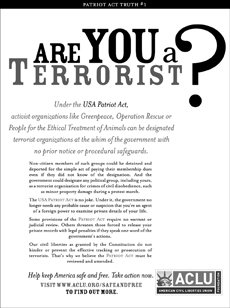Passed shortly after 9/11, the USA PATRIOT (Uniting and Strengthening America by Providing Appropriate Tools Required to Intercept and Obstruct Terrorism) Act implemented new strategies of counter-terrorism to be carried out by the Attorney General. Several hundred pages longer than the average bill, it was read in its entirety by only two congressmen- the only two who voted against it. It was only after the bill was passed that doubts about its constitutionality began to arise.
After cautioning me not to believe anything I learned about the USA PATRIOT Act on the internet, Republican Senator to North Carolina Richard Burr told me, “as one of the drafters of the bill, I do not think it poses any threat to the First amendment rights of Americans.”
What Burr neglects to tell us is how the act affects the rest of the Bill of Rights. The First Amendment is the most coveted by Americans, so by outwardly stating that it is protected, the underlying privacy violations in the act are overlooked, such as violations of the Fourth and Fifth Amendments. The Fourth Amendment, which protects us from unreasonable seizures and searches and prohibits the issuing of a warrant without “probable cause” (as defined by the Attorney General), is undermined in the act, which states that if the warrant keeps any tangible property or wire or electronic communication from being seized, it can be delayed. The court can extend the delay indefinitely.
The Fifth Amendment protects our right to habeas corpus, due process, and keeps our private property from being taken for public use without “just compensation.” Not only is compensation not mentioned in the act, judicial review and habeas corpus are explicitly disregarded. There is also no right to appeal in such a case, and the final word is left to the Supreme Court with its “Rule of Decision.”
It’s been almost three and a half years since 9/11 and though future terrorist attacks are possible, the extreme actions described in the act may no longer be necessary. Richard Burr told me that in a time where there is less threat of terrorist attack, he thinks it may be a good idea to broaden some of the restrictions set by the act.
However, something tells me most of the country will keep the act around: those who have unwittingly chosen a sense of security over a sense of freedom.
For example, there is now an expansion on the National Electronic Crime Task Force directed by the Secret Service, and the government is monitoring e-mails and websites. It sounds improbable since the Internet is practically boundless, but they screen e-mails for words like “bomb” and “attack”, and they monitor hits on certain websites. This is privacy violation posing as counter-terrorism.
In section 411 of the bill, “Definitions Relating to Terrorism,” engaging in terrorist activity is partly defined by, “gathering information on potential targets for terrorist activity.” If you go online to do research about terrorist attacks or learn about Al Queda, they don’t know why you’re looking at those things. According to the Patriot Act, that constitutes “probable cause” for investigation. And since they don’t need a warrant, the cause need not even be very “probable.” If they decide that there is enough “evidence” for you to be a suspected terrorist, you will be taken into custody.
The same section of the act also states that if suspected of soliciting terrorist activity, your activity will be considered as such, unless you can prove that you didn’t know your solicitation would further terrorist actions.
What happened to innocent until proven guilty?
And maybe I’m missing something in the political jargon of the act, but I don’t see anything about what happens if they make a mistake. If you are indicted and it turns our you’re innocent, as an American citizen you deserve full compensation for your lost time and wages, as well as any tangible property they may have taken from you, with or without a warrant.
The PATRIOT Act was written with good intentions, but it goes too far in many aspects. As Americans, we have the right to privacy, due process, judicial review, and habeas corpus. We need to educate ourselves about our rights, and keep track of the laws that are passed, because they all affect us in some way. The act needs to be reworked, either to reclaim our Bill of Rights liberties, or to expose what rights we have lost.
Being patriotic means supporting ones country. Violating the rights of its citizens is not patriotic. We want the world to be a democracy; but we are setting a terrible example.

